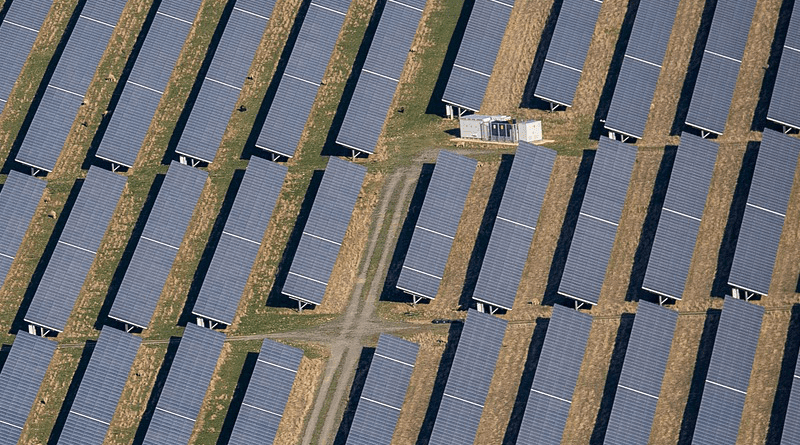EU Commission Mulls Higher Renewable Energy Target For 2030
By EurActiv
By Kira Taylor
(EurActiv) — The European Commission is looking to increase the EU’s renewable energy target for 2030 as part of plans due next week, which also include faster permitting rules for new projects and a solar strategy that could make rooftop solar mandatory for all new buildings, according to leaked proposals seen by EURACTIV.
The proposals are expected to be published on 18 May as part of EU plans to reduce dependence on Russian energy following the invasion of Ukraine.
Speeding up the transition to renewable energy will reduce emissions and Europe’s dependency on energy imports as well as provide affordable energy prices to EU citizens and businesses, according to the draft obtained by EURACTIV.
Given the pressing need to accelerate the deployment of renewable energy, the EU renewable energy target should be increased, it continues. The new target is not decided yet, with the new percentage showing as “XX” between squared brackets in the proposal, which would amend the EU’s renewable energy directive.
The European Commission last year already proposed raising the EU’s renewable energy target to 40% by 2030, up from 32% currently. The proposal was part of a package of climate legislation tabled in July, which aims to reduce the EU’s greenhouse gas emissions by at least 55% before the end of the decade.
But with the war in Ukraine, the Commission is considering ways to accelerate those plans. In March, it called on the European Parliament and EU countries to consider “higher or earlier targets for renewable energy and energy efficiency” as they debate the July package of proposals, dubbed ‘Fit for 55’.
In the European Parliament, there is already strong support for increasing the renewables target to 45% by 2030. And there are also moves among some EU governments to support increased ambition on renewables, although it is less clear whether there is a majority among them to back this.
The European Commission does not comment on leaks.
Solar strategy
As part of the drive to decrease Europe’s dependence on Russian fossil fuels, the EU is expected to come forward with several proposals on 18 May, including a new guidance document on permitting and a strategy for solar power, industry sources said.
According to a leaked solar strategy seen by EURACTIV, solar energy has significant potential to quickly become a mainstream part of the EU’s power and heating systems in Europe, which would help the bloc achieve its climate goals and reduce its dependence on Russia.
The draft strategy lays out a four-point roadmap to boost solar energy for European citizens and industry, building on the Commission’s REPowerEU communication presented in March.
One element of this strategy is a European Solar Rooftops Initiative, which if fully implemented, would add 17 TWh of electricity after its first year of implementation – 17% higher than current EU projections – and, by 2025, would generate 42 TWh of additional electricity, according to the leak, although these numbers are not finalised.
As part of this, the strategy proposes combining solar deployment with roof renovations, install solar energy in all public buildings fit for it by 2025 and have at least one renewable energy community in every municipality with a population of 10,000 or more by 2025.
In addition, the European Commission is considering making the installation of rooftop solar compulsory for all new buildings, although this is still under discussion, and wants to limit permitting procedures for rooftop solar in existing buildings to three months.
The strategy also proposes an EU Skills Partnership for onshore renewable energy to ensure there are enough trained workers to rollout renewables. And a European Solar Industry Alliance will be launched to establish an innovation-led, resilient solar value chain in Europe.
According to Walburga Hemetsberger, the CEO of trade association SolarPower Europe, the industry needs to reach 1 terawatt of total solar capacity by 2030, a solar manufacturing fund and new measures to maximise the potential of solar rooftop.
Tackling permitting issues
Permitting has long been a thorn in the side of the renewables industry. It is a common and avoidable obstacle to solar and renewable deployment, according to Hemetsberger.
“The waiting periods and administrative procedures are unnecessarily burdensome and variable across the EU – and often authorities do not have the resources to respond efficiently to permitting requests,” she told EURACTIV.
To tackle this, the EU is preparing to publish new guidance on permitting for EU countries as well as a legislative proposal to give greater certainty to project promoters and investors.
Like in Germany, EU countries will need to ensure that permit-granting procedures are considered an overriding public interest. This includes planning, construction and operation of renewable energy plants, storage and grid connections.
The leaked legislative proposal seen by EURACTIV calls for strict time limits for permitting procedures. For instance, the process for new projects in renewable go-to areas should not exceed one year and repowering permits in these areas for capacities under 150 kW should not exceed six months.
Outside these areas, project permits should not take more than two years and repowering permits for projects under 150 kW should not take more than one year.
The draft also requires EU countries to identify specific land and sea areas necessary for the installation of renewable energy infrastructure within a year of the law coming into force.
Alongside this, EU countries will need to set up or designate at least one contact point that, on request, should guide applicants through and facilitate the administrative process.
This matches calls from the wind industry for 1-2 year permitting times, better spatial planning and one-stop shops. It also meets the industry’s demand that authorities not replying in time will mean a positive answer, although only in go-to areas.

